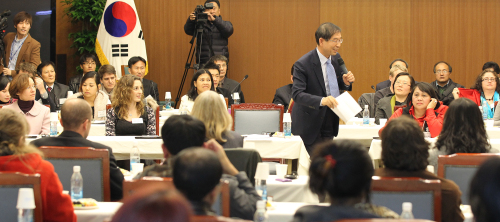Education policy the focus of town meeting with capital’s foreign residents
Expatriates living in Seoul gathered at City Hall on Friday to voice their concerns about living in the capital to its new mayor.
More than 100 of the city’s 360,000 expats attended the 2011 Seoul Town Meeting with Seoul Mayor Park Won-Soon.
Park kicked off the meeting, his first opportunity to address foreigners specifically, with a brief welcoming speech about his view of the importance of becoming a global city, citing the numerous places he had live abroad.
“I think the best way to find solutions for problems is listening to the diverse opinions of the people who are actually suffering from them,” said Park.
Park stayed throughout the entire program, something which attending expats responded to favorably. His predecessor, Oh Se-hoon, had attended the meetings, but had not stayed to the end.
The main focus of the meeting was education and its relationship with multicultural families.
Several called for the need to educate the Korean population on multicultural issues and tolerance.
“This whole multicultural issue is a massive issue and it think it is one of the most important things that Korea and Seoul has to deal with at the moment,” said Karrie Matthee.
Matthee said that the measures in place to deal with multicultural children and families will only further racism in the country.
“While the programs that they put in place are somewhat necessary, in some ways they continue to marginalize students even further by putting them into a group of different people,” she said, adding that she grew up in South Africa during the Apartheid.
A member of the Seoul International Women’s Association, Matthee emphasized the need for tolerance and a willingness to include minority children, an essential step to becoming a global city.
Mirriam Simasiku, an immigrant wife with a master’s degree from her native Zambia, expressed her frustration on the lack of recognition she receives here after arriving in the capital six years ago.
 |
Seoul Mayor Park Won-soon speaks to foreign residents during the Seoul Town Meeting at City Hall on Friday. (Yonhap News) |
“People go so far as to treat us like children,” she said, later adding that she is taking her post-graduate Ph.D. in public policy at Korea University in an attempt to change the system from within.
Aside from the theme of education, questions regarding pedestrian safety also drew much attention.
Gregory Brooks-English, a professor at Yonsei University, received the most applause when he asked the city to address the issue of motorcyclists on sidewalks after sharing a harrowing story involving his young son.
Brooks-English said his 4-year-old son was almost run over by a motorcyclist speeding across the sidewalk.
The Seoul Metropolitan Police Agency’s responded by saying they are already enforcing the ordinance.
However Park did personally address the professor, telling him that he will focus on the city’s traffic laws to prioritize pedestrians, followed by bicyclists and lastly motorized vehicles.
Alan Timblick, head of Seoul Global Center, also gave an overview of the town hall meeting and its effect on the Seoul Metropolitan Government’s implementation of policies regarding foreigners.
According to Timblick, 23 of 76 suggestions made during the meetings were reflected in the implementation of local government’s policies for the past five years.
A policy implemented after a meeting in 2008 was increased medical access for foreigners, including emergency call translation and other medical counseling services.
“We’ve been doing this for many years now and what we’ve tried to do this year particularly is to be more comprehensive in terms of the opinions that were reflected and the groups in terms of ethnic and nationality, the composition of the people who attended today.”
“I tried to show in my presentation at the beginning that these are very real recommendations and they are listened to and they are reflected in terms of the polices that the Seoul city implements,” said Timblick.
Responses to the meeting were mixed. Some were frustrated with the non-specific responses, while others expressed satisfaction of what the city has done with the program in the past.
“We would like to see ourselves in those positions driving policy for our children,” said Simasiku, adding that the city uses ideas from expats but through the process “get it all wrong.”
However Sean Watts, a Yonsei University professor, was impressed with the meeting.
“I’m very impressed with their answers,” said Watts, who has been following the globalization of Korea and the Seoul Global Center for the past 17 years.
“I’ve seen Alan Timblick do an amazing job. Almost everything that is discussed each year he says what was discussed the previous year and what he’s done to do it so I’m very happy with what is going on.”
Matthee also appreciated the city’s efforts.
“I really applaud them for having this town meeting, I don’t think there are a lot of cities in the world that invite foreigners to have a voice,” she said.
“I think the meeting was very valuable. I expect these valuable opinions from expats will help promote better living circumstances so that everyone can live happily in this beautiful city regardless of race, religion or nationality,” said Park, addressing the audience at the end.
By Robert Lee (
robert@heraldcorp.com)








